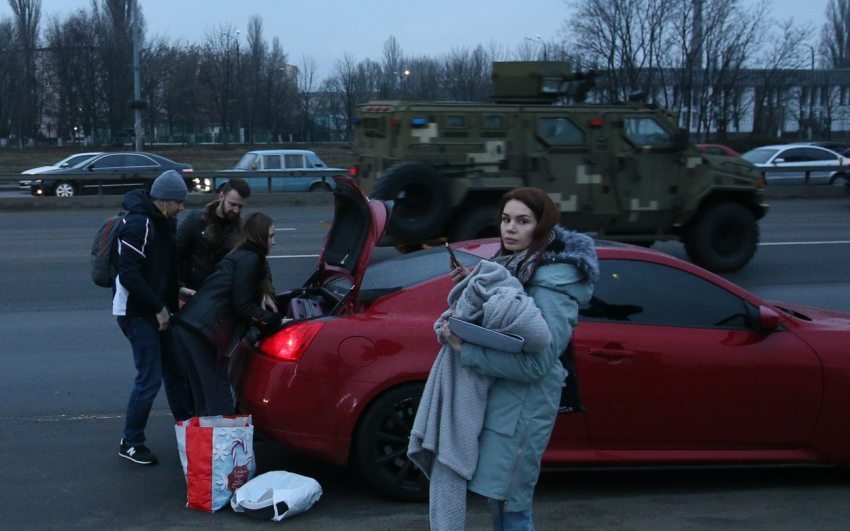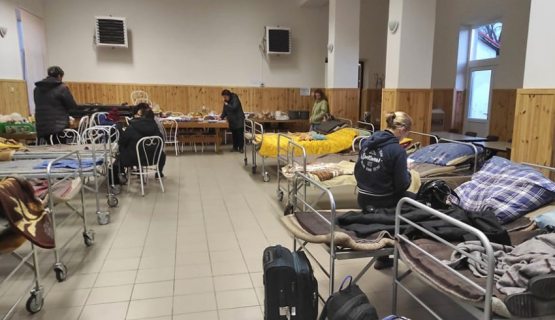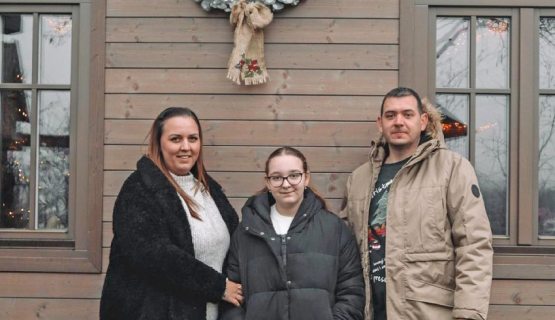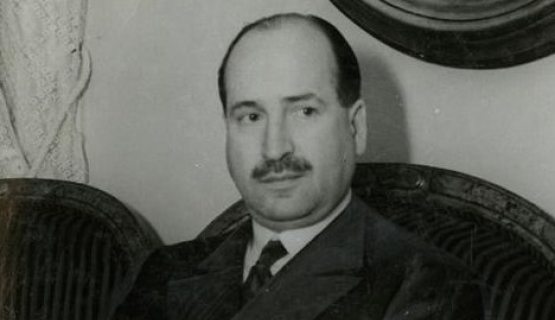”I am afraid if I left home, I would have nowhere to return to”
The Ukrainian-Russian war has caused great fear among the Hungarians in Ukraine. Whoever had the chance to leave the country has already left but there are also those who stayed of their own free will. Ukrainian Hungarians tell their stories.

Looted shops, emptying villages, fear - that's pretty much what the mood in Transcarpathia is like now. Schools, post offices and small shops have closed. In the first days, frightened people stormed shops, banks, and the Hungarian consulate to apply for passports, and then set off en masse for Hungary.
Most of the people in Bene in Beregszász (Berehovo) also left for Hungary, leaving only the elderly in the village. "On the evening of 23 February we went to bed in good spirits, and then on the morning of 24 February, we woke up to the news that Ukraine had been attacked. A bomb had been dropped 150 km from us, and Kharkiv, the second most populous city, had been bombed all night. So why shouldn't our little village of barely two thousand people be attacked?" - shares the concerns of István, a high school student who arrived in Hungary with his family a few days ago. They walked to Tiszabecs, where they were met by a friend and a large number of volunteers. "Volunteers came every five minutes with hot tea, sandwiches, cakes and later they even made a big cauldron of paprikáskrumpli! I have never seen such unity that I experienced among Hungarians!"- he says.
"We only brought a change of clothes"
Children experience events with similar difficulty as older people, even if they do not understand the horrors of war. "The teachers have tried to reassure the class, although the kids don't really understand what is happening. Some of them were crying because the school closure would mean that the carnival would be canceled," shares a mother from Beregszász (Berehovo). Although they live in Balazsér, Krisztina's husband works in Hungary and only comes home every four months. She was afraid to stay in Ukraine with their four children, so she followed him to Hungary. "The two little ones were happy to see their father, but the big ones were very upset that they had left everything at home, as we had only brought a change of clothes. They also felt sorry for their cats, who are now being fed by my sister and a neighbour," she says. The family came to Hungary with great difficulty. Long queues were already forming as they approached the Ukrainian border, and a fight broke out between frustrated drivers who had been waiting for hours. In addition, the grandparents who had set off with them were forced to turn back because Krisztina's 15-year-old brother's passport had expired and he was not allowed to cross. "When we had to part, even those who didn't belong to us cried" she recalls. In order to reach the Hungarian border with her children and her other brother sooner, she decided to continue on foot, but even so, they arrived at the Hungarian border after two hours, where they had to wait another two hours because their friend with transport couldn't meet them because his car broke down. Finally, an unknown family helped them find accommodation for the night. They are now staying with their mother-in-law and, although she hopes they won't have to stay in Hungary for long, she is trying to find a place to rent.
"My son is frightened by every noise"
Men between 18 and 60 years old who are of military age will no longer be allowed to cross the border from 25 February. As a result, many women and their children have been forced to set off alone, without their partners, and families have been torn apart.
The situation was reversed for Tamara, a single mother raising her son alone: the mother stayed at home and her 17-year-old son went to live with his godmother in the Czech Republic. The mother feared that her son would be conscripted. "I don't understand what they want with 18-year-old inexperienced children. I didn't give birth to my son for war" she says. She and her son talked a lot about the war, which frightened the boy. "We didn't sleep at night because every noise scared him. He is safe now, but he is worried about me and his grandmother. What will happen to her if something happens to us?" Tamara has not left Ukraine because she has nowhere else to go. Moreover, at the moment she has no access to her wages (panic withdrawals have led banks to limit cash withdrawals to 3,000 hryvnias, which is about 100 USD) and she is afraid to leave her small house. "I'm afraid that by the time I come back, someone will take it."
According to István, who fled from Bene, the residents there fear the same thing, that Ukrainian refugees will come to the town and steal from them, taking over their houses. "My grandfather, 73, does not want to leave his house, which his grandfather built with great difficulty, to foreigners. I, on the other hand, in this situation think that I can have a house anywhere, but I only have one life."
Those who stayed
There are also many Hungarians who are staying in Ukraine of their own free will.
Elvira from Transcarpathia does not want to leave the country out of love for her country. She is now working as she has always done, leaving her three children behind. "I live 200 meters from the radar station, and I work there too, but I'm not afraid at all. We have stocked up on food and candles in case it comes to that, but I think everything will be sorted out soon. I have confidence in the president, who loves the country and the people," she says. She thinks people are panicking unnecessarily and she does not understand the veterans who have fled to Hungary fearing conscription instead of defending their country. "I also tell my children not to be afraid, but to believe and pray. Whatever happens, we will stay together and hold on as long as we can."
Lajos from Nagydobrony is also optimistic. Although many of his foreign friends have invited him, and he has prepared the most necessary things, he is not going anywhere for the time being. But most of the locals have already left the country - 2,000 of the 6,000 inhabitants remained. No wonder, as hundreds have been called up for military service. Lajos, however, is not worried about conscription - he did not serve because of his university studies at the time, so he is not on the register. "There is no major military base in Transcarpathia, only the 128th Brigade in Munkács (Mukachevo), who inflicted heavy losses on the separatists at Debaltseve in 2015, so we hope that they will not fire on Nagydobrony," he explains the reason for his decision.
What happens next?
The Hungarians who we talked to in Transcarpathia all reported that the situation is much worse than in 2014 when the war broke out in eastern Ukraine. "The fighting was not so close then, but now the Russian soldiers are pushing up," Tamara points out. "This war is much bloodier than the previous one, and it's only been going on for a few days," adds István.
The situation of the country and of Hungarians in Ukraine is uncertain. Lajos expects a drastic rise in prices and emigration and believes it is likely that the current government will be replaced by a pro-Russian government that will revise the language law (the public use of the mother tongue).
Tamara also fears that the events will further exacerbate the Ukrainian-Hungarian conflict in Transcarpathia.
In Beregszász (Berehovo), there have already been several conflicts between Ukrainian refugees settled in the city and locals. "When they hear us speaking Hungarian, they look at us with a grim look, which makes us feel like outsiders." And the limit on cash withdrawals has also led to an increase in thefts and burglaries. She says the best she can do now is pray for the war to end.






